Fostering Growth: Women in Bahrain’s fintech sector
On November 1st, the Atlantic Council’s empowerME Initiative, in collaboration with the United States Embassy in Bahrain and Bahrain FinTech Bay, hosted the second workshop in a series of four for the first cohort of the Women Innovators Fellowship (WIn Fellowship) in Bahrain. The session took place both virtually and in-person at the Bahrain FinTech Bay offices. The event focused on Bahrain’s booming fintech industry and the growing role of women in the sector.
Lynn Monzer, associate director of the Atlantic Council’s WIn Fellowship initiative, offered the opening remarks. The panel included Bader Sater, the chief executive officer of Bahrain FinTech Bay; Noora Al-Nusuf, head of corporate affairs for the Middle East at Standard Chartered Bank; Jamal Fakhro, managing partner of KPMG in Bahrain; and Batool Alkhaja, director of public policy at Rain Management with Lynn Monzer moderating.
The panelists shared their expertise in finance, technology, and fintech, touching upon the progress Bahrain has made in gender parity in employment, the challenges women entrepreneurs face, and shared advice for women navigating the industry.
Key discussion points
The workshop started with Lynn Monzer highlighting the fellowship’s commitment in the progress of women entrepreneurs in the Middle East. She emphasized the crucial focus of the topic of the panel – the intersectionality of women, technology, and finance in Bahrain stating that “the country is becoming a hub of innovation and growth, standing as a unique microcosm in the global fintech arena.”
Bader Sater provided an overview of the current state of the nascent fintech industry in Bahrain. He expressed that his aspiration for its success and growth is quite high, the adoption of banks and financial institutions of new technology, and the growing start-up ecosystem. While Noora Al-Nusuf highlighted the current state of women in Bahrain’s financial sector asserting that the recent reforms in the Kingdom enabled women to access a wide range of roles and leadership positions across the entire work force. Yet, in the financial sector, women hold only 13 percent of the sector’s workforce, and 32 percent of them are in leadership or managerial positions.
Although men and women in Bahrain have equal employment opportunities, Jamal Fakhro notes that the low level of female participation in fintech can be explained by the newness of the industry. He anticipates a rise in of women’s participation in the Fintech industry once it becomes more established in Bahrain emphasizing the job flexibility that the industry provides. Sater observed that cultural barriers hinder women’s access to the sector. He pointed out the significant increase in the number of women in tech and coding roles over the years, attributing this change to the dismantling of social stigma.
Batool Alkhaja highlighted the foundational contribution of women in fintech, particularly in crypto currency and blockchain. Alkhaja mentioned that pivotal role of Rain Management in shaping the regulatory environment in Bahrain, noting that women have been integral part of this process. She also noted that 38% of Rain’s employees and 50% of the leadership are women.
As the conversation moved to female entrepreneurship, Bader Sater pointed out that although the share of women-led start-ups is not high, there are several initiatives actively working to grow and support female-led companies across Bahrain. Sater explained that the lack of equal respect that his female colleagues – founders of companies or in leadership roles – is another problem related to the cultural perception and can be changed as the norms evolve.
Noora Al-Nusuf mentioned no existing technical barriers preventing women from accessing financial services, the financial sector is proactively working to make services and employment more accessible to demographics that previously found it challenging. She mentioned digitization and AI, as well as initiatives for flexible working hours, remote working, and parental leave for both mothers and fathers. Al-Nusuf highlighted programs by Standard Chartered Bank that encourages women to enter the tech industry highlighting the importance of these programs in fighting social stigma. Batool Alkhaja echoed Al-Nusuf, referring to her personal experience stepping out of her comfort zone into the tech industry and now seeing change in the industry.
On solutions, Bader Sater emphasized the importance of role models and presenting women’s successes to inspire change. Al-Nusuf and Alkhaja noted the importance of early education in increasing women participation in different industries. Collaboration between the government and the private sector can also help catalyze this change. Al-Nusuf explained that the private sector can help by sharing best practices and policies that are already embedded in the company with the government to help inform legal rules, regulations, and government-sponsored programs. Jamal Fakhro urged all women, especially in fintech, to find mentors – someone you believe in, to ask and to observe.
The Way Forward
Bahrain is among the world’s leading fintech hubs, contributing over 17% to its GDP and driving economic growth. The financial sector is also Bahrain’s largest employer, with Bahrainis accounting for over 67% of the nearly 14,000-strong workforce. The technological advancements adopted by the sector are propelling its growth not only domestically but also positioning it as a leader in fintech across the Middle East region.
While the fintech industry has emerged as a promising field relatively unburdened by traditional gender biases, women’s representation remains concentrated at the bottom of the organizational hierarchy in the sector, with few breaking through the glass ceiling to reach managerial and decision-making positions. This is evident in the fact that only 32% of the financial sector workforce in Bahrain are women, and only 13% of women in the financial sector hold leadership positions.
Unlocking the full potential of Bahrain’s fintech sector requires cultivating an ecosystem that empowers and supports female entrepreneurs to flourish. With the fintech industry projected to expand sixfold, from $245 billion to $1.5 trillion by 2030, this presents a significant opportunity for the industry to capitalize on the contributions of women. This can be achieved by investing in education and skill development programs tailored to women’s needs is essential to equip them with the knowledge and expertise required to succeed in the fintech sector. This includes fostering STEM education from an early age to cultivate a pipeline of women with the technical aptitude to thrive in the industry.
Public-private partnerships can play a pivotal role in bridging the funding gap faced by women entrepreneurs in the fintech sector. These collaborations can provide women-led fintech startups with the necessary capital and funding to launch and scale their ventures. Dedicated funding programs specifically designed for women-owned fintech startups can be established through these partnerships. Additionally, streamlining loan application processes through collaborations with financial institutions can further facilitate women’s access to funding.
Bahrain has made significant strides in embracing technology and innovation, positioning itself as a regional leader in the fintech industry. However, there is still room for improvement, particularly in fostering an inclusive environment that empowers women to thrive in the sector as mentioned by the panelists. The discussion needs to shift to action in order to transform the takeaways and suggestions from the event into sustainable progress.
Nibras Basitkey is the Program Assistant with Atlantic Council’s empowerME initiative at the Rafik Hariri Center for the Middle East.
Rachel Friedman, Young Global Professional with the Atlantic Council’s Rafik Hariri Center for the Middle East.
WIn Fellowship cohorts
Related content


empowerME
empowerME at the Atlantic Council’s Rafik Hariri Center for the Middle East is shaping solutions to empower entrepreneurs, women, and youth and building coalitions of public and private partnerships to drive regional economic integration, prosperity, and job creation.
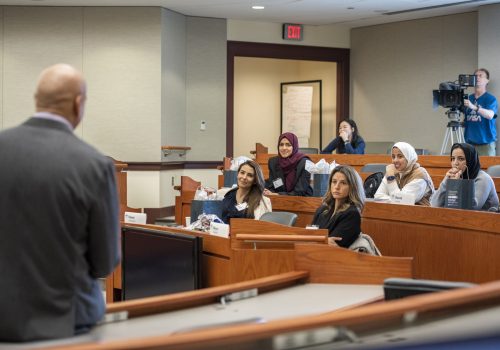
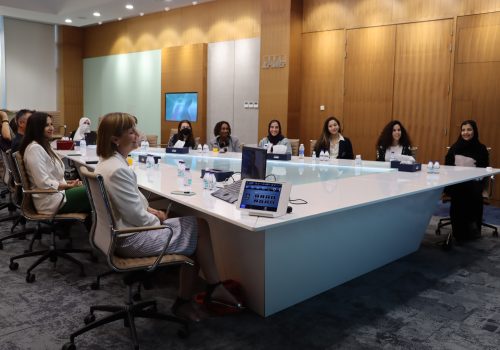
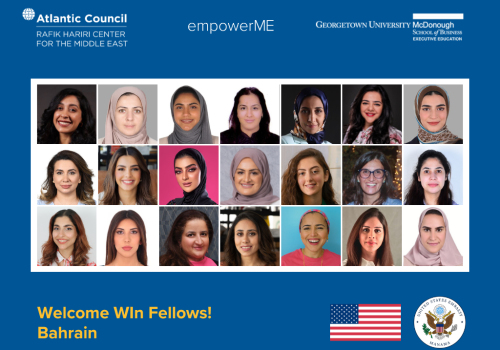
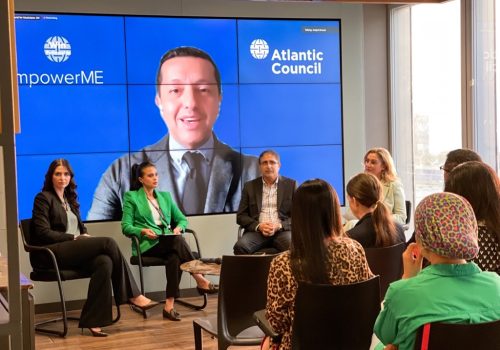
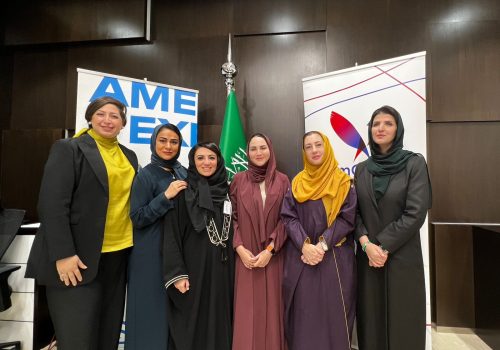
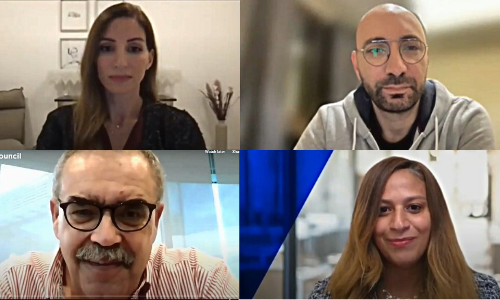
Follow the conversation on social media using #ACempowerME